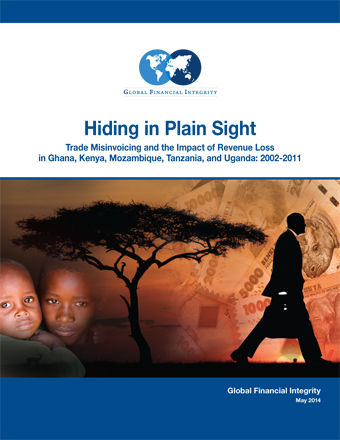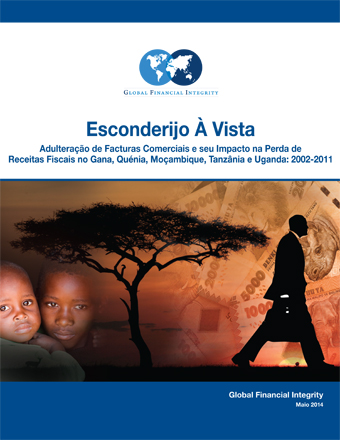This May 2014 case study on the impact of trade misinvoicing in Ghana, Kenya, Mozambique, Tanzania, and Uganda—titled “Hiding in Plain Sight: Trade Misinvoicing and the Impact of Revenue Loss in Ghana, Kenya, Mozambique, Tanzania, and Uganda: 2002-2011”—found that the fraudulent over- and under-invoicing of trade is hampering economic growth and costing these developing governments billions of U.S. dollars in lost revenue.
 Download Full Report Download Full Report |
 Baixar Versão em Português Baixar Versão em Português |
[wptab name=’Overview’]
Primary Findings
Between 2002 and 2011, US$60.8 billion moved illegally into or out of Ghana, Kenya, Mozambique, Tanzania, and Uganda using trade misinvoicing:
The report is only the second by GFI to use our new methodology to estimate tax revenue loss from trade misinvoicing. The study finds that the potential average annual tax loss from trade misinvoicing amounted to roughly 12.7% of Uganda’s total government revenue over the years 2002-2011, followed by Ghana (11.0%), Mozambique (10.4%), Kenya (8.3%), and Tanzania (7.4%).1
Methodology
GFI Chief Economist Dev Kar and GFI Junior Economist Brian LeBlanc developed robust economic models that highlight the drivers and dynamics of illicit flows in both directions for each of the five countries analyzed. Nevertheless, GFI cautioned that their methodology is very conservative and that there are likely to be more illicit flows into and out of these countries that are not captured by the models. GFI notes that—due to data issues, varying customs rates by commodity and sector, and various other factors—it is difficult to assess the true tax revenue loss stemming from trade misinvoicing in a particular country. The tax loss figures presented in this study are rough estimates of the possible impact that trade misinvoicing could have on government revenues in Ghana, Kenya, Mozambique, Tanzania, and Uganda.
Country-Specific Findings
| Ghana | Kenya | Mozambique | Tanzania | Uganda | |
|---|---|---|---|---|---|
| Cumulative Trade Misinvoicing Outflows | US$7.32bn | US$9.64bn | US$2.33bn | US$8.28bn | US$8.39bn |
| Cumulative Trade Misinvoicing Inflows | US$7.07bn | US$3.94bn | US$2.93bn | US$10.44bn | US$457mn |
| Gross Cumulative Trade Misinvoicing Inflows + Outflows | US$14.39bn | US$13.58bn | US$5.27bn | US$18.73bn | US$8.84bn |
| Gross Annual Trade Misinvoicing as % of GDP | 6.64% | 7.76% | 8.98% | 9.36% | 7.05% |
| Gross Annual Trade Misinvoicing as % of ODA | 189.17% | 288.63% | 49.51% | 131.21% | 97.94% |
| Cumulative Outflows via Export Under-Invoicing | US$5.1bn | US$9.26bn | US$1.26bn | 0 | US$261mn |
| Cumulative Outflows via Import Over-Invoicing | US$2.21bn | US$377mn | US$1.08bn | US$8.28bn | US$8.13bn |
| Primary Method for Shifting Money Illicitly out of Country | Export Under-Invoicing | Export Under-Invoicing | Both Export Under-Invoicing & Import Over-Invoicing | Import Over-Invoicing | Import Over-Invoicing |
| Cumulative Inflows via Import Under-Invoicing | US$4.6bn | US$3.94bn | US$2.22bn | US$108mn | 0 |
| Cumulative Inflows via Export Over-Invoicing | US$2.43bn | 0 | US$711mn | US$10.34bn | US$457mn |
| Primary Method for Shifting Money Illicitly into Country | Import Under-Invoicing | Import Under-Invoicing | Import Under-Invoicing | Export Over-Invoicing | Export Over-Invoicing |
| Cumulative Tax Revenue Loss via Trade Misinvoicing ^1 | US$3.86bn | US$3.92bn | US$1.68bn | US$2.48bn | US$2.43bn |
| Average Annual Tax Revenue Loss via Trade Misinvoicing ^1 | US$386mn | US$435mn | US$187mn | US$248mn | US$243mn |
| Tax Revenue Loss via Trade Misinvoicing as % of Total Government Revenue ^1 | 11.0% | 8.3% | 10.4% | 7.4% | 12.7% |
| Ghana | Kenya | Mozambique | Tanzania | Uganda |
Footnotes
- GFI notes that—due to data issues, varying customs rates by commodity and sector, and various other factors—it is difficult to assess the true tax revenue loss stemming from trade misinvoicing in a particular country. The tax loss figures presented in this study are rough estimates of the possible impact that trade misinvoicing could have on government revenues in Ghana, Kenya, Mozambique, Tanzania, and Uganda.
- All monetary values are expressed in U.S. dollars (USD).
[/wptab]
[wptab name=’Policy Recommendations’]
Policy Recommendations
The report recommends several policies to combat trade misinvoicing, including:
- Governments should significantly boost their customs enforcement, by equipping and training officers to better detect intentional misinvoicing of trade transactions;
- Trade transactions involving tax haven jurisdictions should be treated with the highest level of scrutiny by customs, tax, and law enforcement officials;
- Government authorities should create central, public registries of meaningful beneficial ownership information for all companies formed in their country to combat the abuse of anonymous shell companies;
- Financial regulators should require that all banks in their country know the true beneficial owner of any account opened in their financial institution;
- Ghana, Kenya, Mozambique, Tanzania, and Uganda should actively participate in the worldwide movement towards the automatic exchange of tax information as endorsed by the G20 and the OECD;
- Kenya and Uganda should follow the lead of Ghana, Mozambique, and Tanzania in joining and complying with the Extractives Industry Transparency Initiative (EITI); and
- Government authorities should adopt and fully implement all of the Financial Action Task Force’s anti-money laundering recommendations.
[/wptab]
[wptab name=’Read the Report’]
Read the Report
[wptab1 name=’English’ set=’1′]
Hiding in Plain Sight: Trade Misinvoicing and the Impact of Revenue Loss in Ghana, Kenya, Mozambique, Tanza… by Global Financial Integrity
[/wptab1]
[wptab1 name=’Português’ set=’1′]
[/wptab1]
[/wptab]
[end_wptabset skin=”gray” location=”top” width=”100%” ]

